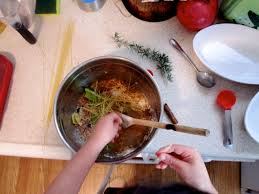记忆方法
将“concoct”分解为“con”+“coct”。联想“con”有结合、连接之意,而“coct”与“cook”相似,意为烹饪。想象一个人在“连接”不同的食材或元素来“烹饪”出一个新发明或计划,这样就可以记住“concoct”的含义为“调制”、“策划”或“发明”。
以上内容由AI生成, 仅供参考和借鉴
中文词源
concoct 配制
con-, 强调。-coct, 来自cook的过去分词。即放在一起煎煮的,熬制。
英语词源
- concoct
-
concoct: [16] To concoct an excuse is the same, etymologically, as to ‘cook’ one up. The word concoct comes from the past participle of Latin concoquere, a compound verb formed from the prefix com- ‘together’ and coquere ‘cook’. This was a derivative of the noun coquus ‘cook’, which was the source of English cook. The Latin verb developed several figurative senses, including ‘digest food’ and ‘reflect on something in the mind’, but ‘fabricate’ seems to be an English creation (first recorded in the late 18th century), developed from an earlier ‘make by mixing ingredients’.
=> cook - concoct (v.)
- 1530s, "to digest," from Latin concoctus, past participle of concoquere "to digest; to boil together, prepare; to consider well," from com- "together" (see com-) + coquere "to cook" (see cook (n.)). Meaning "to prepare an edible thing" is from 1670s. First expanded metaphorically beyond cooking 1792. Related: Concocted; concocting.
权威例句
- 1. I gave her a tip on how to concoct a new kind of soup.
- 我教她配制一种新汤的诀窍.
- 2. And they had taken me so long to concoct.
- 我花了好长时间编造这些谎言.
- 3. How did the inventive chef ever concoct such strange dish?
- 怎么发明的厨师都编造这种奇怪的菜?
- 4. It was the least controversial, most insipid topic I could concoct.
- 这是我能够编出来的最没有争议, 也最没意思的一个主题.
- 5. I began to concoct explanations of my own.
- 我开始思考自己的解释.

